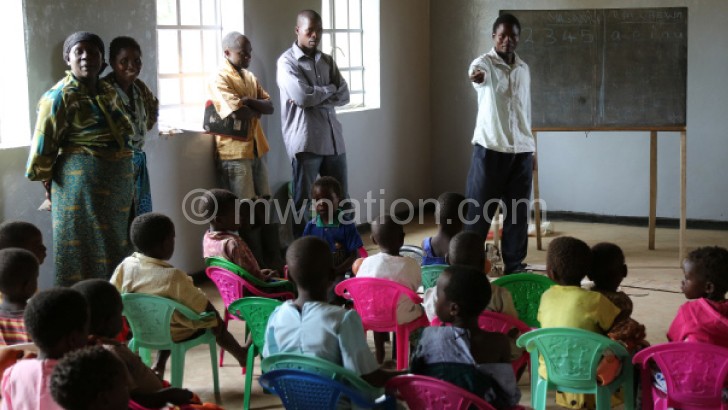Councils shun ECD agenda
Depressing trends of early childhood development (ECD) in Chitipa confirms the vital sector is NGO-driven sector, skewed and fragile. JAMES CHAVULA writes.
In their minds, pioneers of the country’s ECD education strides saw M’mera Mpoyamba Campaign getting greater investment to ensure children attain a solid start in life. When the campaign began in 2009, they opted for community-based childcare centres, modernised its policy, elected the then president Bingu wa Mutharika as ambassador of the new challenge which he left to deputy Joyce Banda. The envoy launched the ECD in-roads by reiterating government’s commitment to make sure children have quality first steps in life.
Speaking at the launch in Kasungu, Banda alluded to the district’s popular cash crop, tobacco, chanting: “Fodya nku nazale (a good nursery guarantees a good leaf).”
Then, Unicef spokesperson Victor Chinyama, a keen M’mera Mpoyamba pioneer, always likened giving children under eight a quality childhood care to building a skyscraper.

“It will be shaky without a strong foundation. Most likely, it will crumble,” he said.
The enthusiasm was sky-high and government pledged to ensure every newborn had a “strong foundation” for those with a good beginning perform brilliantly and scarcely drop out of school.
However, the revolution seems at risk as government has almost left the running of ECD programmes to non-governmental organisations. It is against this background that the locals in Chitipa, where public funds account for less than one tambala in every kwacha devoted to ECD, the locals have risen to demand more funding from both Capital Hill and the district council.
“It is ironic, even councils are not investing in ensuring that children develop basic behaviour, attitudes, skills and abilities usable throughout their lives,” says Chitipa District Education Network chairperson Sydney Simwaka.
Negligible funding from the council has not only left the community child-care centres run by school dropouts, who work as volunteer caregivers, but also subjected the children to monotonous lessons. Uneven distribution of ECD services is worrisome as community based child cares (CBCCs) and trained caregivers are concentrated in areas where interested NGOs work.
This inequality is manifest in Chitipa with the population of under-eight children estimated at almost 23 000.
The majority of the centres are in Nthalire where ActionAid, which provided almost half of nearly K293.5 million, invested in ECD last year. Other players include World Vision, Livingstonia Synod Aids Programme and Plan Malawi.
The amount may not be a small change in the mountainous setting where only 40 out of almost 200 CBCCs are up to “minimum standards”, but very few arms of the council contribute to the funds. A recent assessment conducted by Chigwirizano Community-Based Organisation of Nthalire and a council official shows the local government agency only pumps in 0.02 percent of the funding for ECD-an equivalent of two tambala in every K100-with ActionAid and World Vision Malawi injecting K53 and K43, respectively.
Government cannot continue restricting its role to regulation alone, the locals say.
“What would happen if the partners pulled out? ” asks Maiden Kayira, a mother of six, who is one of the 10 caregivers at Mahowe.
Five years ago, almost 202 children at the centre would perch in tree shades if a prayer house that once housed the CBCC was not obtainable. In 2011, ActionAid constructed a model ECD centre in the remote area. It is one of the seven pristine facilities constructed, almost 33 have been either refurbished or equipped and 280 caregivers trained.
“Without the partners, the children would be rotting at home or waiting for a turn to use the church,” Kayira said.
Children in 159 CBCCs in Chitipa have to do with poor learning facilities. They mirror inequalities and inferiority to private kindergarten facilities where children from well-to-do urban settings go. They are far apart, leaky and closed when it rains, yet congested and too risky for the children.
They lack clean water for drinking, cooking and body care. In 2013, six in 10 CBCCs were drawing drinking water from unprotected wells, two from rivers and two others from boreholes.
Besides, thousands of children were relying on unskilled caregivers, who often offer them activities not befitting their age and culture. The skilled ones usually quit due to lack of incentives.
Lonely Shawa, Chitipa district agricultural development officer says: “The partners are there to supplement government efforts, but in this case government appears to play a supporting role.”
Social welfare official Tennyson Kaunda concurs.
“Beyond regulating ECD, every government agency has a role to play to change the situation,” he says.
For Misuku Ward councillor Osman Kanyika, who heads the education committee at the council, warns against continued exclusion of ECD issues in decision-making.
“This is why Chitipa is the worst performing district in primary school examination out of 34 schools,” says Kanyika, whose hard-to-reach area is among the excluded destinations along with Kameme and Iyombe.
ActionAid programme manager Wongani Mugaba asks the council to incorporate ECD in the district’s strategic plan and make sure it gets a fair share of funding.
The partner-driven approach is skewed and fragile. It waters down national figures, with the 2015/16 budget for the neglected intervention hitting K2 billion for the first time. Sadly, councils’ budgets remain stunted and seedlings of the crop called “future leaders” are wilting.





